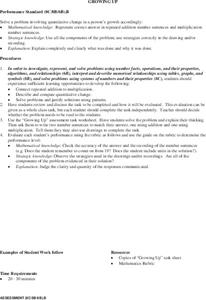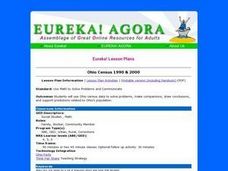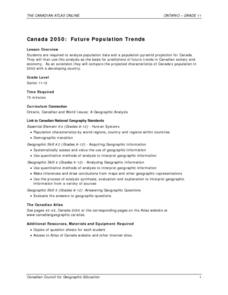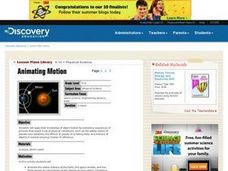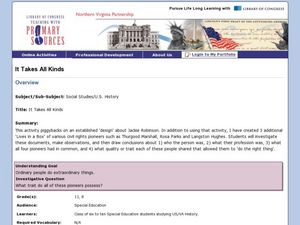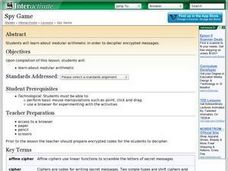Curated OER
Properties of Fractals
Students build a working definition of regular fractal, look carefully at the concepts of dimension and scale, and are introduced to logarithms. They solve simple exponential equations for the exponent both by trial and error and using...
Curated OER
Enzymes in Action: An Inquiry Approach to the Effects of Enzymes
Learners experiment with enzymes as key components of chemical reactions in all living things through this series of lessons.
Curated OER
Canada 2050: Future Population Trends
Students analyze population data and a population pyramid projection for Canada. They make predictions of future society and economic trends.
Curated OER
Pollen Collection And Identification
High schoolers investigate plant reproduction, pollen collection and identification. They collect pollen samples over a twenty four hour period and examine them under a microscope.
Curated OER
Properties of Fractals
Pupils build a working definition of a regular fractal, they measure the concepts of dimensions and scale, they explore the concept of a logarithm and they attempt to solve simple exponential equations for the exponent both by trial and...
Curated OER
Growing Up
Young scholars solve a given problem and explain their thinking using two number sentences to match their answer. One number sentence must use addition, one must use multiplication, and students must explain their answers. Includes...
Curated OER
Investigating the Compost
Students are introduced to the concept of biodegradability. In groups, they use the internet to research the types of materials that affect the process. They collect materials from their local community and develop an experiment to test...
Curated OER
Ohio Census 1990 & 2000
Students use Ohio census data to solve problems, make comparisons, draw conclusions, and support predictions related to Ohio's population. They interpret and work with pictures, numbers and symbolic information.
Curated OER
Cosmic Collisions and Risk Assessment
In groups, middle schoolers create their own scientific impact experiments using ordinary materials, and observe and measure results with a variety of impacting bodies and velocities.
Curated OER
Canada 2050: Future Population Trends
Students analyze population data and a population pyramid projection for Canada. Using this information, they predict what the future trends in the population might be and its effect on Canadian society as a whole. They compare and...
Curated OER
Animating Motion
Students apply what they recall about objects in motion by animati ng sequences of pictures that model a set of physical conditions. They animate the orbital motions of the Earth, the space shuttle, and the Moon based on calculations of...
Curated OER
Rock Identification Lab
Eighth graders compare and contrast the three different types of rock. For this earth science lesson, 8th graders classify rock samples according to their correct rock type. They design their own data collection table.
Curated OER
Graphs and Functions
Students are introduced to plotting functions on the Cartesian coordinate plane seen several categories of functions, including lines and parabolas
Curated OER
A Very Simple Conductivity Meter
Students conduct a simple conductivity meter to test the ionic or non-ionic nature of water samples including one from their home.
Curated OER
Bead It!
Fourth graders use colored beads in two problems and explore the use of proportional reasoning as a problem solving method. Working Students, in groups, explain their reasoning strategies orally, and through drawings.
Curated OER
What's the Problem?
Fourth graders redefine the problem of Where's the Heart of Florida? and begin to formulate possible solutions using graphic organizers.
Curated OER
Particulate Sampler
Students estimate the extent of particulate air pollution present in their neighborhoods.
Curated OER
Micro-Magic With Sticky Ions
Young scholars view a video about the formation of precipitates. They complete a worksheet that asks them to identify what makes a compound form and what holds it together.
Curated OER
It Takes All Kinds!
Pupils view video clips and observe similarities and differences between animals. They sort animals into groups for a zoo. They make a graph of their observations and review scientific classifications.
Curated OER
Pocket Change
Students explore algebraic relationships using the coins in their "pocket." Interactive games that demonstrate the use of estimation in algebraic problem solving help them build a framework for understanding word problems in a way that...
Curated OER
Parks Canada - True to Our Nature
Students discuss visits to national parks, the differences between national parks and other parks, and plan an ecologically friendly trip to several parks that emphasizes conservation and national heritage.
Curated OER
The Demise of Copper's Trading Power
Eighth graders evaluate statistical equations. They examine data from archaeologists at Jamestown, complete statistical equations using the sets of data, and graph the results.
Curated OER
Where in the World?
Students explore how GPS works, the mathematics behind the technology, and how GPS is used. They find positions in one and two dimensions, and participate in a WebQuest that explores how math is used to find a location on Earth using GPS.
Other popular searches
- Quantitative Reasoning
- Qualitative Quantitative
- Quantitative Data
- Qualitative and Quantitative
- Quantitative Force Diagram
- Quantitative Observations
- Quantitative Relationships
- Qualitative vs Quantitative
- Quantitative Research
- Quantitative Force
- Quantitative Research Plans
- Esl and Quantitative Data







